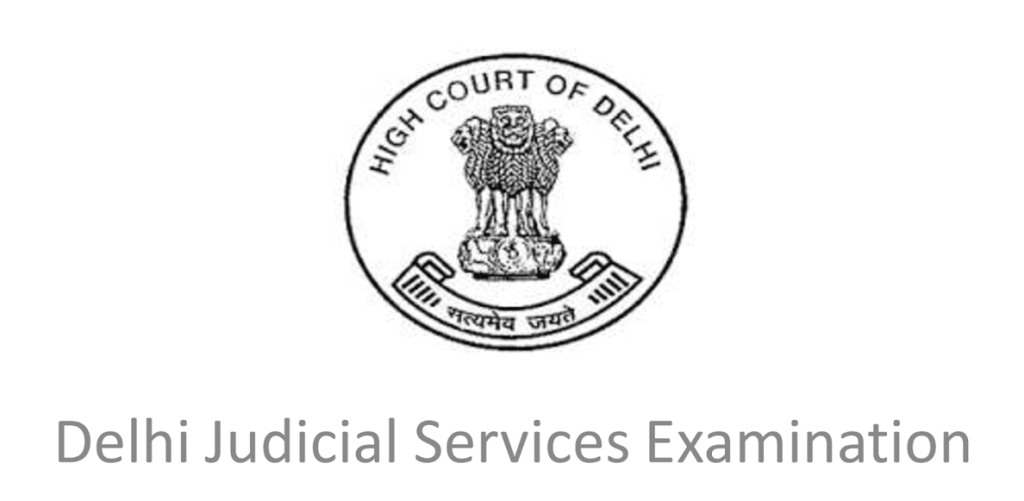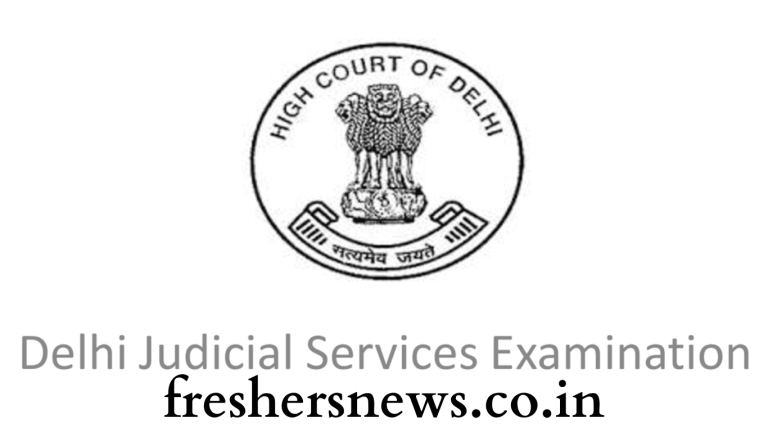Introduction
Aspiring judges who need to work in the Delhi High Court and its decreased courts must skip the judicial exam, additionally called the Delhi Judicial Service Examination. Here, we are talking about the Delhi Judiciary Syllabus.

This check is well known for its thorough curriculum, stringent selection approaches, and potential to evaluate a candidate’s legal expertise, analytical capabilities, and suitability for judicial obligations. This newsletter provides an extensive precis of the Delhi Judiciary syllabus, its organization, important subjects, observed advice, and essential assets.
Here, we are talking about the Delhi Judiciary Syllabus:
Delhi Judiciary Examination Structure
There are 3 phases to the Delhi Judiciary Examination:
- Objective-type initial exam
- Descriptive-kind predominant exam
- Viva Voce (interview)
Preliminary Examination
The goalfashion questions inside the initial examination are intended to serve as a screening tool for applicants who’ve been shortlisted for the main exam.
The following is covered in the Preliminary Examination syllabus:
Broad Awareness and Current Events
- National and foreign Events: Keep abreast with noteworthy overseas ties, massive coverage modifications, and cutting-edge occasions.
- Indian History and Geography: Recognize the significant historical occurrences, the warfare for independence, and the United States’s bodily features, consisting of important rivers, mountains, and geographical regions.
- SocioEconomic Development: Pay interest to the critical packages, social issues, and monetary regulations that affect the nation.
Indian Constitution
- Preamble: Recognizing its goals and importance.
- Fundamental Rights and Duties: Carefully analyze Articles 12 to 35 and Article 51A to complete all the sections thoroughly.
- Guiding Principles of Public Policy: Sections 36 via 51.
- Government Structure: A thorough comprehension of the legislative, executive, and judicial departments. The most extensive amendments are the 42nd, 44th, 73rd, and 74th Amendments.
Civil Procedure Code, 1908
- Subject count: Number, territorial, and economic jurisdiction kinds are discussed, along with their respective importance.
- Res Judicata: The concept that a choice made in a case involving the equal parties is last. Suits: Comprehensive steps from the lawsuits’ start to resolution.
- Execution of Decrees: Procedures for sporting out judicial orders.
- Reviews and Appeals: The protocols and justifications for critiques and appeals in civil court cases.
The 1973 Code of Criminal Procedure
- Criminal Court Hierarchy: The composition and authority of the several criminal courts.
- Investigation and Trial: The proceedings from the FIRs are submitted to the judgment.
- Bail Procedures: Various styles of bail and requirements for his or her issuance.
- Appellate and Revisions: Procedures for contesting convictions in criminal instances and amending orders from decreased courts.
Main Exam
The descriptive Mains Examination assesses the candidate’s capability to offer a cause of criminal theories and reasoning. There are four papers in it:
General Language and Legal Knowledge
- Essay Writing: Composing essays on topics of legal, it is conducted to test the deep knowledge of the candidate
- Civil Law-I
- Indian Contract Act, 1872: Components, overall performance, breach, and remedies of a legally binding settlement.
- The Indian Evidence Act of 1872: covers proof’s character, admissibility, and relevance in criminal prosecutions.
Viva Voce: Interview
The candidate’s persona, communication talents, and wellknown eligibility for a judicial function are evaluated for the duration of the Viva Voce. The panel assesses:
- Legal Acumen: Knowledge of modern-day rulings and felony thoughts.
- Communication Skills: The ability to express ideas confidently and honestly.
- A decide’s impartiality, objectivity, and ethical considerations are all a part of their temperament.
The 1860 Indian Penal Code (IPC)
- Mens rea and actus reus are the 2 popular standards. Murder, culpable homicide, and assault are offenses against the human frame.
- Offenses Against Property: Criminal misappropriation, robbery, and robbery.
- Offenses Concerning Public Tranquility: Illegal gatherings, disturbances, and assaults.
The 1872 Indian Evidence Act
- Types of Evidence: direct, oblique, precise, and number one
- Guidelines for admissibility: Rules governing admissible evidence.
- Observers: Proficiency and assessment.
- Burden of Proof: Recognizing who is chargeable for what in one-of-a-kind conditions.
Law Contracts
- Contract Formation: Fundamentals, which include offer, acceptance, and attention.
- Performance and Discharge: Terms governing the contract’s overall performance and discharge.
- Violations of Contract: Claims that can be added.
Law of Families
- Hindu Law: Succession, maintenance, divorce, and marriage.
- Mohammedan Law: Inheritance, preservation, divorce, and marriage.
- The Special Marriage Act governs interfaith marriages and covers preservation, divorce, and marriage.
Law of Property
- Land Acquisition Act: Government acquisition of personal land.
- Transfer of Property Act, 1882: Regulations on the market, loan, rent, and gift.
- Easements: Rights concerning the usage of any other person’s land without the permission of the owner
FAQs
How is the Delhi Judiciary Examination conducted?
- There are three stages to clear the Delhi Judiciary Examination:
- The Mains Examination (Descriptive Type) assesses the candidate’s writing skills and in-intensity of the candidate.
- The Preliminary Examination acts as a screening check for the examination.
- Viva Voce (Interview): This evaluation evaluates the applicant’s disposition, functionality to talk, and sizable shape for a judicial position, attitude, way of thinking
How can I keep up with present-day occasions with a purpose to put together for the preliminary exam?
- To stay informed about contemporary events, stay updated with The Hindu, The Indian Express, or The Times of India regularly. Read thoroughly all the current affairs.
- Read felony periodicals and courses, like Supreme Court Cases (SCC) and All India Reporter (AIR).
- Use internet assets like SCC Internet, Manupatra, and Lawctopus to get the maximum present-day traits and case legal guidelines.
Are there any specific websites or apps that could help you get geared up
- Yes, several websites could help with planning:
- For access to case legal guidelines and legal articles, use SCC Online and Manupatra:
- Visit Lawctopus for records, career steering, and legal news.
- Check out these YouTube channels and online guides for lectures and coaching advice for the judiciary exam.
How do I prepare for the examination by studying the Indian Constitution?
- The Preamble, Fundamental Rights, Directive Principles of State Policy, and Fundamental Duties must be your primary areas of analysis when analyzing the Indian Constitution.
- Recognize the functions of the legislative, executive, and judicial branches of government.
- Examine fantastic modifications and how they affect the judicial system.
- 5 See conventional textbooks for in-intensity explanations, including Durga Das Basu’s Introduction to the Constitution of India.
Which part of the Delhi Judiciary syllabus does the Limitation Act play?
- The 1963 Limitation Act is great as it establishes the cut-off dates for submitting complaints. Applicants need to be aware of:
- The differing statutes of boundaries for exceptional styles of complaints.
- The circumstances wherein these instances can be postponed or extended.
- The consequences of bringing prison action after the allotted dilemma time has passed. How massive is the Indian Evidence Act to the Mains and Preliminary Exams?
- It is critical to recollect the Indian Evidence Act of 1872 for both examination ranges:
- Candidates ought to realize the basics of proof, the diverse varieties of evidence, and the admissibility suggestions to be able to bypass the initial exam
Conclusion
A challenging and prestigious path for law graduates hoping to go into the judiciary is the Delhi Judiciary Examination. Through thorough guidance, an intensive comprehension of the syllabus, and admission to appropriate resources, applicants can decorate their possibilities of fulfillment. For this path, functions like strength of mind, perseverance, and dedication to justice are essential.
Check out the website and stay updated: https://delhihighcourt.nic.in/recruitment/result/current

